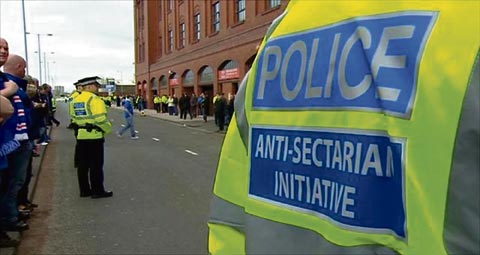BY Ian Dunn | December 13 | ![]() 0 COMMENTS
0 COMMENTS ![]() print
print

Report confirms Catholic schools are not the root of sectarianism
Government advisory group says issue has had its day in Scotland in report welcomed by the Church
A report commissioned by the Scottish Government has found that Catholic schools are in no way responsible for sectarianism.
The Advisory Group on Tackling Sectarianism today released a report on sectarianism in Scotland and its findings on Catholic schools were welcomed by the Church.
The working group’s report states categorically that it believes sectarianism is not linked to faith schools, the overwhelming majority of which are Catholic schools in Scotland.
“We do not believe that sectarianism stems from, or is the responsibility of, denominational schooling, or, specifically, Catholic schools, nor that sectarianism would be eradicated by closing such institutions,” it says. “However, we fully recognise the important role that education plays in addressing social issues and bringing young people together. We have concluded that those involved in the delivery of education should develop opportunities for engagement, co-operation and relationship building.”
The group, set up by Minister for Community Safety Roseanna Cunningham, called on schools to create ‘imaginative anti-sectarian partnerships’ but says it does not believe any further legislation is needed on sectarianism.
The Scottish Government set up the group—led by Duncan Morrow, former chief executive of the Community Relations Council in Northern Ireland— last year to look at the issue in the country
Peter Kearney, the director of the Scottish Catholic Media Office, told the SCO that the Church would study the report in depth but it ‘welcomed the recognition that denominational schooling played no part in creating or supporting sectarianism.’
In its first report, the group found said the default response in Scottish society to sectarianism was ‘avoidance’ and there was a need for ‘acknowledgement, diagnosis and relevant action.’
“A healthy society requires leaders to be inclusive in their approach and honest when weaknesses in relationships or understanding persistently emerge. Leaders must be willing to take action which may require change in long established procedures and habits,” the group states. “Progress will only be achieved through open dialogue and leadership and the fostering of a spirit of generosity, leading to a decisive cultural sea-change against sectarianism based on a new culture of responsibility-taking rather than avoidance.”
However the report did suggest that sectarianism in Scotland should not be defined as anti-Catholicism, or as being synonymous anti-Irish racism and cannot be ‘simply equated with overtly aggressive bigotry.’
Dr Morrow, who chaired the group, said Scotland is ‘weary of the lingering impact of sectarianism’ but it was something that could be banished if the will was there.
“It is, perhaps, not surprising that the deep-rootedness of sectarianism in Scotland has led to a culture which fluctuates between silence and sensationalism, while other equality issues have been driven forward in a more holistic and coordinated way,” he writes. “But what has been obvious to us is that sectarianism has had its day in Scotland, and there is an increasingly large groundswell of people who are tired of its worn-out rhetoric and the way in which it manifests itself in exclusionary and confrontational behaviour.”
Minister for Community Safety Roseanna Cunningham welcomed the publication of the report and announced that the work of the group will continue until March 2015.
“This is an independent report from series of highly respected individuals in their respective fields. The Scottish Government is grateful to them for producing this substantial contribution to a very important issue,” Ms Cunningham said. “It is a challenging report for all of us all across Scottish society— Government, local authorities, community organisations, clubs and fans alike—and we have a duty to consider its recommendations carefully.
“We agree that no further legislation is required to tackle this issue and that we should seek to ensure further work in terms of education and community engagement projects are progressed to improve people’s understanding of sectarianism and the ways in which it manifests itself. We welcome the fact that the report recognises there is a great deal of hope for the future and that Scottish society is more than capable of tackling this issue. I look forward to studying the report in detail before responding formally in the new year.”











